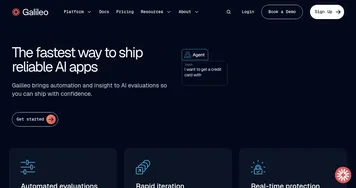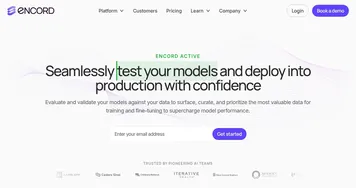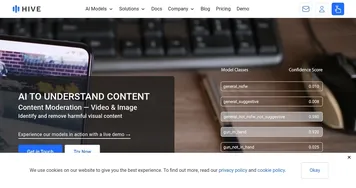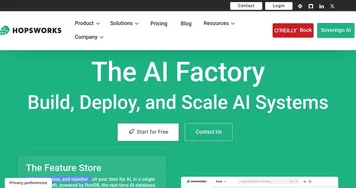Fetch.ai
Fetch.ai is a blockchain-based platform that combines artificial intelligence with autonomous agents to automate tasks and optimize processes. Founded in 2017 and launched via a Binance IEO in 2019, it uses the Cosmos-SDK to create a decentralized network where AI agents, or autonomous economic agents (AEAs), perform tasks like data analysis, DeFi trading, and logistics management. The platform’s core components include the Digital Twin Framework for agent creation, the Open Economic Framework for data access, the Fetch Smart Ledger for transaction recording, and the Agentverse marketplace for agent discovery. The FET token facilitates transactions, staking, and governance.
Key features include DeltaV, a marketplace fusing LLMs and AI agents for service discovery, and ASI:One, a Web3-native LLM designed for agentic workflows. The uAgents library simplifies agent development, while the Fetch Smart Ledger uses a Proof of Stake consensus with differential privacy for security. Applications range from optimizing smart grids to automating travel bookings. The platform supports interoperability with Cosmos-based chains and Ethereum, enhancing its flexibility.
Users may appreciate the platform’s open-source nature and developer tools, like the Agentverse IDE, which streamline agent creation. The ability to monetize AI services via DeltaV is a draw for businesses. However, the platform’s complexity can challenge new users, and reliance on external APIs for some agents raises centralization concerns. Data integrity isn’t fully on-chain, unlike competitors like Chainlink. Integration with legacy systems can also be tricky, limiting immediate adoption. Compared to SingularityNET, which focuses on AI model sharing, or Ocean Protocol, centered on data markets, Fetch.ai prioritizes agent autonomy.
Pricing involves FET tokens, used for transactions and staking, with costs comparable to other blockchain platforms. Network fees vary based on usage, similar to competitors. Recent updates, like async agent replies and geo-aware discovery, improve usability. The platform’s partnership with Bosch and the Fetch.ai Foundation’s non-profit governance add credibility.
Start with the Agentverse tutorials to understand agent creation. Developers should explore the uAgents library for lightweight microservices. Businesses can test DeltaV for service integration but should budget for developer training to maximize value.
Video Overview ▶️
What are the key features? ⭐
- DeltaV Marketplace: Connects users to AI-driven services via a dynamic, LLM-powered interface.
- ASI:One LLM: Web3-native language model designed for agentic workflows and real-time querying.
- uAgents Library: Simplifies creation of lightweight, task-specific AI agents for developers.
- Agentverse IDE: Provides tools for building, deploying, and managing AI agents efficiently.
- Fetch Smart Ledger: Records transactions transparently using a Proof of Stake blockchain.
Who is it for? 🤔
Examples of what you can use it for 💭
- DeFi Trader: Automates trading strategies on platforms like Uniswap using AI agents.
- Logistics Manager: Optimizes supply chain routes with real-time data from AI agents.
- Healthcare Analyst: Analyzes patient data for insights using secure, agent-driven tools.
- Smart City Planner: Manages energy grids with AI agents for efficient resource allocation.
- Travel Agent: Books flights or accommodations based on user preferences via DeltaV.
Pros & Cons ⚖️
- Open-source tools for developers.
- Interoperable with Cosmos, Ethereum.
- Transparent blockchain transactions.
- Partial reliance on external APIs.
- Limited on-chain data verification.
FAQs 💬
Related tools ↙️
-
 Sonar
Delivers real-time, AI-powered search with citations for accurate answers
Sonar
Delivers real-time, AI-powered search with citations for accurate answers
-
 Galileo
Evaluates and monitors AI applications to ensure reliability and accuracy
Galileo
Evaluates and monitors AI applications to ensure reliability and accuracy
-
 Encord Active
Test, validate, and evaluate your models and surface, curate, and prioritize the most valuable data
Encord Active
Test, validate, and evaluate your models and surface, curate, and prioritize the most valuable data
-
 Hive
A set of APIs that enable developers to integrate pre-trained AI models into their apps
Hive
A set of APIs that enable developers to integrate pre-trained AI models into their apps
-
 Hopsworks
Streamlines AI development with a scalable feature store and MLOps platform
Hopsworks
Streamlines AI development with a scalable feature store and MLOps platform
-
 Pump
Optimizes cloud costs using AI and group buying for startups
Pump
Optimizes cloud costs using AI and group buying for startups

